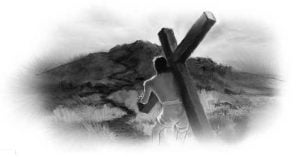Suffering For Christ- Lesson Plan
Key Thought: Peter told his readers they were to expect trials to test them. They were not to find it strange, but rejoice that they shared in Christ’s sufferings.
1. Have a volunteer read I Peter 5:10.

Image © Pacific Press from GoodSalt.com
a. Ask class members to share a thought on what the most important point in this text is.
b. Why should believers expect trials to be a normal part of the Christian life?
c. Personal Application : If I find myself asking why I must endure trials in life, why is that the wrong attitude? Share your thoughts.
d. Case Study : One of your relatives states: “How can anyone be joyful or happy when they undergo stressful and negative events in their lives? Maybe after it’s over, but not during the trial.” How would you respond to your relative?
2. Have a volunteer read I Peter 3:13-17.
a. Ask class members to share a short thought on what the most important point is in this passage.
b. How do we prepare to give an answer to every man that asks us? Are we to have a personal testimony, study the Scriptures, or what?
c. Personal Application : Have you ever suffered for doing something right? What did you learn about this experience? Share your thoughts.
d. Case Study : One of your friends states, “Not many people are derided, insulted, or persecuted for being Christian today in many areas, but being a Seventh-day Adventist may bring more insults, hatred, and persecution in those areas.” Do you tend to agree or disagree with your friend?
3. Have a volunteer read I Peter 3:19-21.
a. Ask class members to share a short thought on what the main idea of this text is.
b. Who are the spirits in prison that Jesus preached to, and how did he preach to them? (Note : Through the Spirit, Noah preached salvation for 120 years to those people in bondage to sin during the days before the flood. )
c. Personal Application: What does it mean that eight souls were saved by water in the days of Noah? Weren’t they saved from perishing in the water by being in the ark? Share your thoughts.
d. Case Study: One of your neighbors states, “I don’t think we need to be baptized in water to be saved. The baptism of the Spirit is sufficient for us. Baptism is not a sacrament, it is and outward symbol, and thus doesn’t mean anything toward salvation.” How would you respond to your neighbor?
4. Have a volunteer read I Peter 4:17-19.
a. Ask class members to share a short thought on what the main idea of this text is.
b. How and why does judgment begin at the house of God?
c. Personal Application : What does it mean that the righteous scarcely be saved? Share your thoughts.
d. Case Study : Think of one person who needs to hear a message from this week’s lesson. Tell the class what you plan to do this week to share with them.
Truth that is not lived, that is not imparted, loses its life-giving power, its healing virtue. Its blessings can be retained only as it is shared.”Ministry of Healing, p. 148).
 (4)
(4)